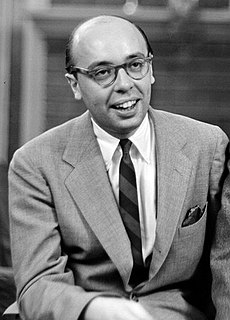A Quote by Lorne Greene
Slavery wasn't something that grew up in the American South. and black people were not the first to be slaves in America. Before them there were 'indentured laborers,' taken out of jails in England and Scotland and so forth and brought to the colonies to work out their terms in the fields and then be set free.
Related Quotes
The real names of our people were destroyed during slavery. The last name of my forefathers was taken from them when they were brought to America and made slaves, and then the name of the slave master was given, which we refuse, we reject that name today and refuse it. I never acknowledge it whatsoever.
The Fourteenth Amendment, after the civil war, in principle brought former slaves into the category of persons, theoretically. But if you actually look, almost all the cases brought up for personal rights under the Fourteenth Amendment were by corporations. Freed slaves couldn't do it. In fact they were pretty much driven back into something like slavery by a north - south compact, that allowed former slave states to criminalize black life, which made a criminal force that was basically used as a forced labor force, up until the 1930s.
We've now got a group of young people in this country who for all practical purposes are American. They grew up here. They've gone to school here. They don't know anything other than being American kids. But their parents may have brought them here without all the proper paperwork - might have brought them here when they were three, might have brought them here when they were five. And so, lo and behold, by the time they finish school, and they're ready to go to college, they find out they can't go to college and, in fact, their status as Americans are threatened.
We were a very politically active family. My father was one of the first lawyers in South Africa to have a black partner, so I grew up very aware of the struggle going on. Coming from that background, it really gave me chills to have my music be a part of the election of the first black American president.
Blacks have experienced a history of victimization in America, beginning obviously in slavery and then another 100 years of segregation. I grew up in segregation. I know very well what it was about and all of the difficulties it placed on black life, and how we were truly held down before the civil-rights movement.
Think of US slavery in 1850, or the subjection of women. Both of these injustices could have been - and were! - defended by pointing out, quite correctly, that this situation of slaves and women had been improving throughout the preceding century. Slaves, in particular, were worked less hard, beaten and raped less frequently, better fed, and less often ripped apart from their families. So would a celebration of moral progress have been appropriate in 1850? Surely not. Slavery could have been and should have been abolished - then, if not before.
One of the key things for me about Madame Walker's life is that she really does represent this first generation out of slavery when black people were reinventing themselves, and as a woman who was the first child in her family born free, she was trying to figure out a way, and she moved from Delta, Louisiana.
As I grew up, I began to discover a little bit about the situation of black people in America and experienced an immediate empathy with the victims of such senseless discrimination. Because although the Turks were never slaves, they were regarded as enemies within Europe because of their Muslim beliefs.
Grandmother pointed out my brother Perry, my sister Sarah, and my sister Eliza, who stood in the group. I had never seen my brother nor my sisters before; and, though I had sometimes heard of them, and felt a curious interest in them, I really did not understand what they were to me, or I to them. We were brothers and sisters, but what of that? Why should they be attached to me, or I to them? Brothers and sisters were by blood; but slavery had made us strangers. I heard the words brother and sisters, and knew they must mean something; but slavery had robbed these terms of their true meaning.




































